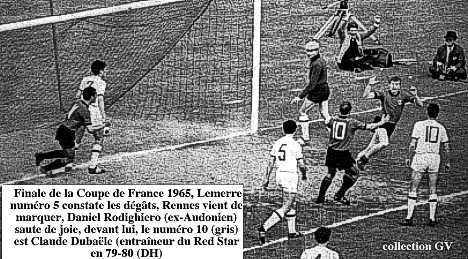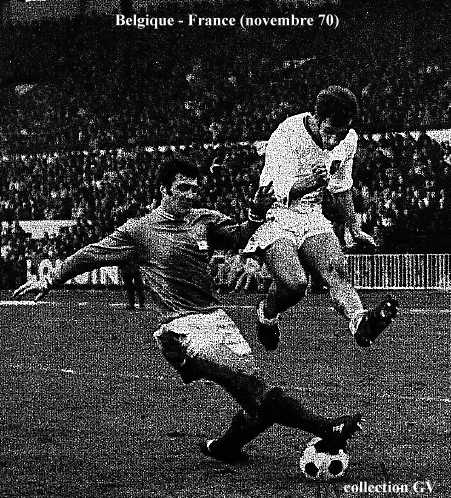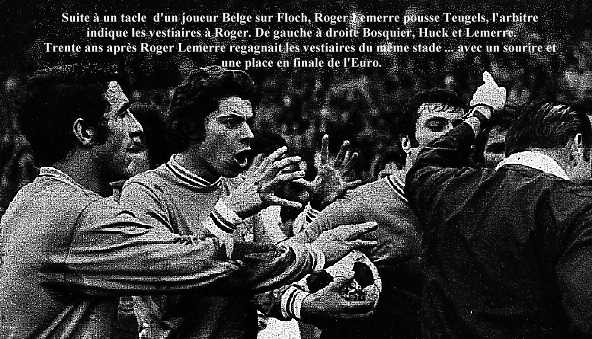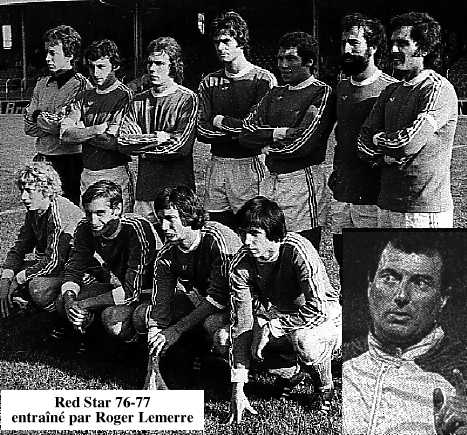ROGER LEMERRE, FOOTBALLER

Before the Euro 2000 final, much media talk centered on the career of Roger Lemerre, as both player and coach. For those who didn't know much about Roger, they were surprised to learn that the road to being national coach had taken him through Saint-Ouen for two spells.
Also discussed were the defensive techniques employed by their opponents Italy, and reference was also made to Helenio Herrera, who invented the ultra-defensive style, and who in his turn was a former French Cup winner with Red Star in 1942. Herrera is part of the Red Star legend, and thus cannot be easily dismissed, but his style of play is opposite to the Beautiful Game. In the years 1960-1970, his concepts have nontheless wasted the talents of numerous gifted Italian footballers.
 Frances' victory against Italy can be seen as a victory for the Beautiful Game, a worthy successor to the 1958 era of the Sweden World Cup Finals and Kopa, Fontaine, Piantoni etc, as well as the 1980s period of Platini, Giresse, Tigana, Rocheteau. Indeed the performance of France in Euro 2000 could be described as being more impressive than the 1998 World Cup triumph.
Frances' victory against Italy can be seen as a victory for the Beautiful Game, a worthy successor to the 1958 era of the Sweden World Cup Finals and Kopa, Fontaine, Piantoni etc, as well as the 1980s period of Platini, Giresse, Tigana, Rocheteau. Indeed the performance of France in Euro 2000 could be described as being more impressive than the 1998 World Cup triumph.
So what is the connection between Red Star and Euro 2000 ? Other than Herreras' tactics reborn in the guise of Italy 2000, one man, Roger Lemerre started his career as coach in 1975 at the Stade de Saint-Ouen.
Before coaching Red Star, Roger Lemerre started as a player at Bricquebec, his birthplace (18th June 1941) before moving on to D1 club in 1961, Sedan, the then cup holders. When he arrived in the Ardennes, Roger was a winger or a center-forward, but afterwards turned defender. In July 1963, Miroir du Football, carried an article entitled "There are Players in France", a portrait of several players including Georges Casolari, Bernard Blanchet and Jean-Claude Hernandez amongst others. Amidst these names appeared our hero from Bricquebec. "Because he is big and strong, and if he can apply himself to the team game, this young man could go far". Not as far as the journalist who wrote those words at that time could ever have imagined.
His career continued with a long stay at Sedan, (1961-1969) including a replayed cup final lost to Rennes in 1965 2-2 & 1-3. There followed six international caps; his debut came on the 25th September 1968, at Marseille where he was a substitute against West Germany, replacing the last ever Red Star international, Jean Baeza. His team mates included Aimé Jacquet (2 caps), as well as Youris' father, Jean Djorkaeff and Bernard Blanchet. During his time at Sedan, he played in the infamous World Cup qualifying match France-Norway at Strasbourg ( 0-1), as well as a 5-0 thrashing of France by England at Wembley. Not all his matches were lost; on the 30th April 1970 a goal from Henri Michel at the Parc des Princes saw off Romania 1-0. Starring that day for France was a certain Jean-Claude Bras !
In 1969 he signed for Nantes for two years. Another lost cup final ensued, crushed 5-0 in 1970 at Colombes by Saint-Etienne, featuring none other than future boss Aimé Jacquet.

Roger was selected for an international against Belgium in Brussels, played at the Stade Heysel, now known as the Stade du Roi Baudouin). Despite winning 2-1, Roger had an early bath following a red card in the 79th minute. Roger waded in to defend his colleague Loulou Floch, victim of a horrendous tackle by an Belgian striker. (see photo).
Roger Lemerre then moved to Nancy 71-73, where he was made captain, and his last international outing came on the 24th April 1971 in a 1-1 draw against Hungary. This was the first draw between the two countries, and Hungary listed Florian Albert, Laszlo Fazekas and Ferenc Bene in their selection. Rogers' playing career came to an end at R.C. Lens (73-75). He didn't feature in the cup final lost 1-0 to Saint-Etienne. That season ended with a match Lens-Red Star...the last ever match for Red Star in D1. Lemerre then joined the club of Saint-Ouen as coach and a new adventure was about to begin.
G. Valck
